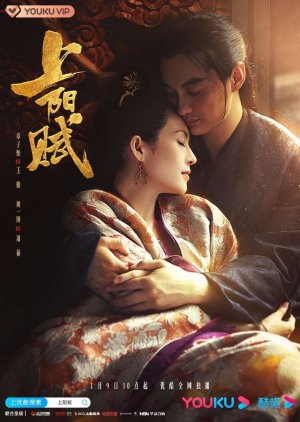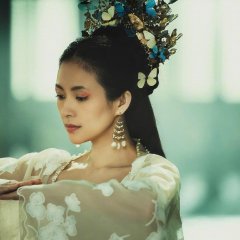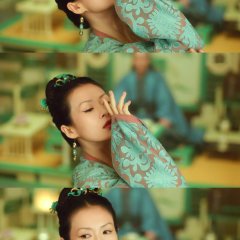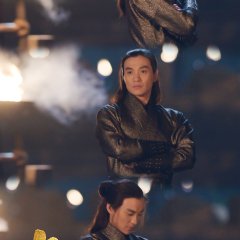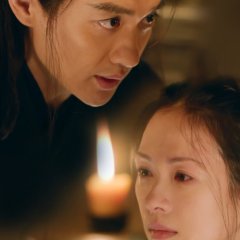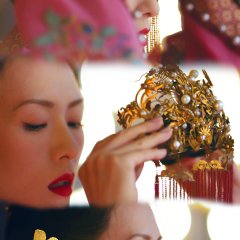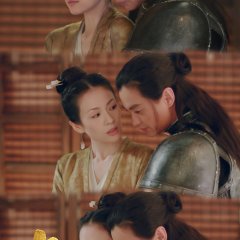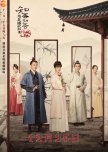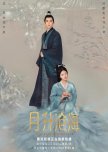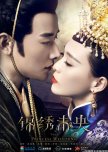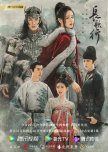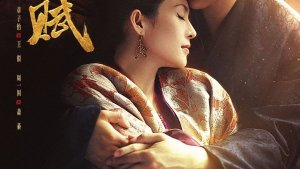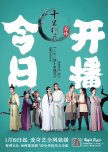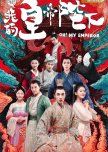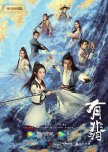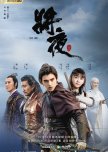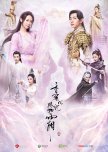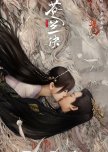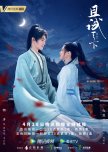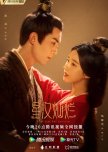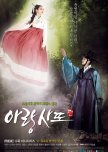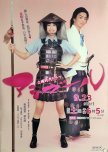 If Harry Potter Was A C-Drama
If Harry Potter Was A C-Drama Wang Xuan and Xiao Qi marry for power but soon fall in love as they fight to protect their homeland. The imperial family is corrupt, and the nobles are indifferent to the people's plight. Wang Xuan, a strong woman, and Xiao Qi, a man of humble origins, are caught in a prophecy linking them to the fate of the empire. Married off by her father to Xiao Qi, Wang Xuan faces betrayal when he is forced to leave on their wedding night. When the Helan Prince kidnaps her for revenge, Wang Xuan begins to admire Xiao Qi's desire for peace, and they grow closer. As power struggles between the Wang and Xie clans, treachery, and rebellion threaten them, Wang Xuan risks everything to protect the third prince and safeguard their future, hoping Xiao Qi can save the day. (Source: MyDramaList) ~~ Adapted from the novel "Emperor's Conquest" (帝王业) by Mei Yu Zhe (寐语者). Edit Translation
- English
- 中文(简体)
- ภาษาไทย
- Русский
- Native Title: 上阳赋
- Also Known As: Emperor Phoenix , Di Feng Ye , Shang Yang Fu , Jiang Shan Gu Ren , Jiāngshān Gùrén , 帝凰业 , 帝王业 , 江山故人 , Monarch Industry
- Director: Cheng Yuan Hai, Hou Yong, Xu Zhi Ming
- Screenwriter: Li Jing Ling
- Genres: Historical, Romance, Drama, Melodrama
Where to Watch The Rebel Princess
Cast & Credits
- Zhang Zi YiWang Xuan / A'WuMain Role
- Zhou Yi WeiXiao QiMain Role
- Tony YangMa Zi DanMain Role
- Yu He WeiWang Lin [Prime minister]Support Role
- Angie ChiuElder PrincessSupport Role
- Kara WaiRoyal Consort GuiSupport Role
Reviews

The Doting Wife
Not Rebel Princess, Monarch Industry, or Emperor Phoenix. The Doting Wife is the most appropriate name and should have been the official title of this long-drawn melodrama. After 2 months and 68 episodes, there can be no denying that although this drama is about Zhang Ziyi, it has nothing to do with her being rebellious (except maybe against her father), but rather everything to do with her being the loving wife who could “do no wrong” in an epic romance.This production wrapped up filming in 2018 and is ZZY’s first ever TV series. She personally bankrolled this project and even had the final say on casting decisions. She recruited a renowned production team, some of whom she had worked with in the past, and they include the following:
Director – Hou Yong (Jasmine Women, Hero)
Art Director – Han Zhong (House of Flying Daggers)
Cinematographer - Philippe Le Sourd (The Grandmaster)
Long story short, this drama absolutely toyed with my emotions and in all honesty, I was left rather disillusioned by the end of it all. However, I attribute this towards my personal expectations instead of an objective evaluation which therefore should not detract from what has been a well-made production. For the most part.
The Rebel Princess is based on Mei Yu Zhe’s first novel, Imperial Industry which was published in 2007 and released in two volumes, Emperor’s Industry Parts 1 and 2. It tells the story of A’Wu, a prominent noblewoman of Shangyang County with royal blood flowing in her veins and who possesses all the wholesome qualities of beauty and talents befitting a highborn. These qualities would eventually endear her to a renowned military commander, Xiao Qi. Together, they would overcome all obstacles and enemies near and far as their love conquers everything in their way to establishing a new era of peace in the kingdom. Something like that, as I was given to understand having not actually read the novel.
The drama pretty much plays out the general plot of the source material but with some deviation in the characterization of the main protagonist, according to viewers. Mei Yu Zhe (aka Amei) is a popular contemporary novelist who is famed for being the “Love Queen” of romance fiction.
Production, direction, art direction and set designs, costumes, cinematography, and sound editing:
The technical aspects are done to near perfection. This is a big budget production of the highest quality filled with a brazen display of grandeur and opulence. Every detail shown is gorgeous and visually stunning. The architecture of the palace and mansions, the lavish interior settings, and intricately designed luxurious costumes for the nobles. The cinematography comprising the effective use of interior lighting, exquisite camerawork and framing of many pivotal moments beautifully capture the essence of those scenes, which are further enhanced by the impeccable sound editing and accompaniment of orchestral BGM.
It’s worth mentioning that discerning and keen-eyed viewers have taken note of anachronisms that were present in the drama. In particular, the design and tailoring of certain costumes worn by A’Wu, among others. The more obvious one would be the Game of Thrones-inspired black armour worn by Xiao Qi’s battalion which simply couldn’t have existed in Imperial China. Although this is a work of fiction, I speculate that the drama is set during the Northern and Southern Dynasties, a period of internal political strife and wars between the central plains and the northern invaders. The scripted dialogue did quote Zhuge Liang after all from the preceding era of the Three Kingdoms. However, I shall suspend disbelief and accept the costume designers taking liberties on this aspect.
It has to be said that the drama progresses at a very uneven pace that corresponds to several major story arcs. The first 20 episodes were very engaging and fast paced. Subsequently after that, the drama slowed down with intermittent dramatic moments and minimal action of note, spread over the course of 30 episodes before slowly picking up the momentum again. The final episode was truly thrilling, but felt rushed, with many shocking twists crammed into a space of 45 minutes.
Acting and cast:
With the exception of the minor supporting cast, the leads and a number of the main supporting cast gave a decent account of themselves.
The legendary Zhang Ziyi needs no introduction, where her list of achievements speaks for itself. She makes the transition from the big screen to the small screen seamlessly and the quality of her portrayal of A’Wu remained steadfast throughout, although towards the latter stages of the show I wished she had injected a bit more intensity and variety in the character’s expressions. The major qualm lies in the fact that at the age of 39, she played a 15-year old character at the very beginning. Nobody, not even her, can pull this off. Fortunately that story arc did not last long so all is forgiven once her character matures into adulthood.
Zhou Yi Wei was handpicked by ZZY for this starring role and we finally understand why. His phenomenal depiction of the stoic but hopeless romantic Xiao Qi has set many viewers’ hearts fluttering. Despite not possessing the effeminate looks and rabid popularity of boyband idols (which is a good thing, in fact), this is a real actor with a mature charisma that makes his version of the ML appears every inch the real life ancient general. His scene-stealing presence is no doubt cultivated by the immense talent that he has, as can be seen in his previous works in Tribes and Empires: Storm of Prophecy, and many others in his ever growing portfolio.
As for the supporting cast, I have thoroughly enjoyed watching Yu He Wei and Angie Chiu who portrayed husband and wife, as well as parents to A’Wu. These 2 veterans have been consistent for many years and their experience is extremely telling, particularly He Wei’s Wang Lin in the way he sold his performance to me. Yuan Hong was fun to watch with his Helan Zhen. Admittedly midway through I started to take him less seriously as a result of watching him in Blessed Girl which was airing concurrently.
In contrast, I wasn’t really invested in Yang You Ning’s portrayal of Zi Dan, as I felt his acting and expressions were somewhat mono-dimensional. Likewise Liu Duan Duan’s Song Huai En, the portrayal lacks the sufficient depth heading towards the bitter end. The weakest performance has to be from Zeng Yi Xuan as Wang Qian, A’Wu’s treacherous cousin.
Screenplay and characters:
Whether it is the source material or adaptation, or perhaps both, the way the story unfolds does not entirely meet my personal expectations. I went into this show anticipating something akin to Nirvana in Fire and The Rise of Phoenixes with heavy focus on clever political machinations and multifaceted power dynamics. I realise now that the core of the story is essentially about romance, jealousy and betrayals. Rather than a political drama with some romance, it is the other way round – an almost theatrical romance with some politics as a side story.
There is more than enough love, lust and toxicity to go around with every character in its multitude of forms. The non-exhaustive list includes attempted rape, sexual assault, three men pining for the same married woman, women pining for married men, the murdered lover, attempted drugging, forced contraception, pregnancies and miscarriages, child abuse, estranged marriages, forced marriages, secret affairs, old flames... And this is before we even get to the regicide, patricide and fratricide. Although this isn’t exactly my cup of tea, I have to acknowledge its single minded tenacity in defining for viewers the true definition of melodrama, complete with vicissitudes and histrionics.
The main characters are generally adequately written. A’Wu arguably does display traits of a Mary Sue, albeit a flawed version within this context. The author was perhaps attempting to showcase the character as virtuous, morally upright and principled but the character comes across as aloof and self-righteous instead. Meanwhile Xiao Qi is the shining example of the ancient heroic general and the perfect gentleman. Wang Lin, as the Prime Minister, is a character I particularly relished. Although an antagonist, I thought the character was worthy of a better ending than the one that befell him.
However I found it somewhat unconvincing and ludicrous how certain characters experienced sudden shifts in personality and motive towards the second half of the show. Song Huai En suddenly had his “head turned” having experienced confusing visions/ dreams of A’Wu. Helan Zhen, the imposing grassland warrior and mortal enemy of Xiao Qi, despite having his limb chopped off and falling thousands of feet off a suspension bridge only to survive to challenge for A’Wu’s affections. There are several other examples of irrational out-of-character behaviours but I shall end my nit-picking here before going overboard.
Action choreography:
This is primarily a historical with minimal wuxia elements, and therefore the action sequences are more grounded and less spectacular, which is the case with the sword fighting sequences. The action is instead predominantly focused on battles between opposing armies and on sieges laid on castles along with the use of catapults, chariots, war horses and other armaments. The battle scenes are fast, furious and frantic.
However the CGI utilised for the visual effects is not exactly the best in the genre and it has to be said that the camerawork for all battle scenes is average, with the typical reliance on repeated sudden zoom shots and unsteady pan shots while accompanied by dramatic sound effects. The coordinated stunts of soldiers engaged in fierce combat appear contrived, with only a handful of stuntmen performing the actual fighting. The armour worn by the soldiers appear obviously ill-fitted, especially the oversized unconventional helmets worn by Xiao Qi’s men, as opposed to those used by the palace guards and imperial soldiers.
Music:
The OSTs are one of the best ever composed for a historical drama. I love 3 tracks in particular. The beautiful opening theme Ode to Shangyang, the powerful ending theme At All Corners of the Earth which was performed as a duet featuring two men (most people were unaware that the”female” voice belonged to Zhou Shen), and the hauntingly evocative Hope For which slowly builds up to a climactic end.
Full listing as follows:
Ode to Shangyang (上阳赋) - Tan Wei Wei (Opening theme song)
At All Corners of the Earth (天涯尽处) - Hu Xia & Zhou Shen (Ending theme song)
Love in This Lifetime (爱于此生) - Elvis Wang
Looking Into the Distance (遥望) - Zheng Yun Long
Lonely Heart (孤心) - Shuang Sheng
Tomorrow (明夕何夕) - Mei Xi
Hope For (盼) - Claire Kuo
Overall:
Objectively speaking, The Rebel Princess is undoubtedly a beautifully-crafted drama. The execution of most aspects is done to near perfection. With the exception of the story, which I feel is overly melodramatic. The genre “Life” should not be tagged to this drama, because the depiction is larger than life and too heavily romanticized to be realistic, even as far as historicals and palace dramas are concerned. Despite my reservations, however, this drama is still worth a watch if you can spare your time for 68 episodes.
A Whole Lot of Frustration in a Gorgeous Package
Most of the other reviewers seem to have really liked The Rebel Princess, which is great, but I thought I'd offer a different perspective since I ended up being very underwhelmed by this drama even though I really wanted to like it. Keep in mind that my c-drama experience is limited (this was my 21st one) and I'm not familiar with the source material of this drama. Also, I watch dramas mostly for the romance.Positives:
+ really nice set design, costuming and lighting, which made the drama feel more realistic and quite refreshing after all the wuxia dramas
+ shot well
+ A'Wu and Xiao Qi were smart and nice and respected each other
+ the acting was fine
Negatives:
- another reviewer suggested that this drama should be watched for the slow burn romance, but I thought the romance wasn't that much of a slow burn and the main couple ended up together quite fast all things considered
- I was mostly invested in the main pair's relationship during the first ~15 episodes, after that their relationship stayed pretty much the same throughout the rest of the drama, which would've been fine had their dynamic been more interesting. And no, I don't mean that I wanted to see a drama-filled tumultuous relationship, I just wanted the drama to explore more in-depth why the two characters loved each other and what made them a great team. Now I just got the feeling that they were together because they were literally the only two equally powerful good people in the show that liked each other well enough. Actually A'Wu and Xiao Qi were mostly in separate places during the show, which might have been technically realistic but also very frustrating if you're in it for the romance.
- the drama was way too long considering how little happened in it
- there was a heavy emphasis on political scheming, which I'm never a big fan of but this time around it was somehow especially boring
- most of the characters were unlikeable and/or uninteresting
- the characters who did bad things during the story didn't get punished either at all or at least not in a satisfying way
- like in some other dramas I've seen, there was an overemphasis on forgiving absolutely everything because fAmILy and bEinG a gOOd pERsOn, which at this point is one of my biggest pet peeves
- rape and the threat of rape was used as a plot device at two different parts of the drama, and in my opinion it wasn't handled very well
- I spent most of the drama just waiting for something interesting to happen
- normally I dislike unhappy endings but now I was low key waiting for someone to die because at least that would've been vaguely interesting
- okay actually I was so unattached to the characters that even if they had all died I would've been like "huh, okay" and moved on
Watch if you enjoy:
- more realistic historical dramas
- political scheming
- heavy emphasis on side characters
- forgiving people who don't necessarily deserve it
- slow story progression
- emphasis on other aspects of life besides romance
Don't watch if you're looking for:
- a plot-heavy story
- surprising plot developments
- strong character development all throughout the story
- in-depth romance
- frequent interaction between the main pair
- revenge plot
Recent Discussions
| Title | Replies | Views | Latest Post | |
|---|---|---|---|---|
| The series is a solid advertising of alcohol by Blue water tigress | 0 | 0 | RichardHolder Sep 23, 2024 | |

